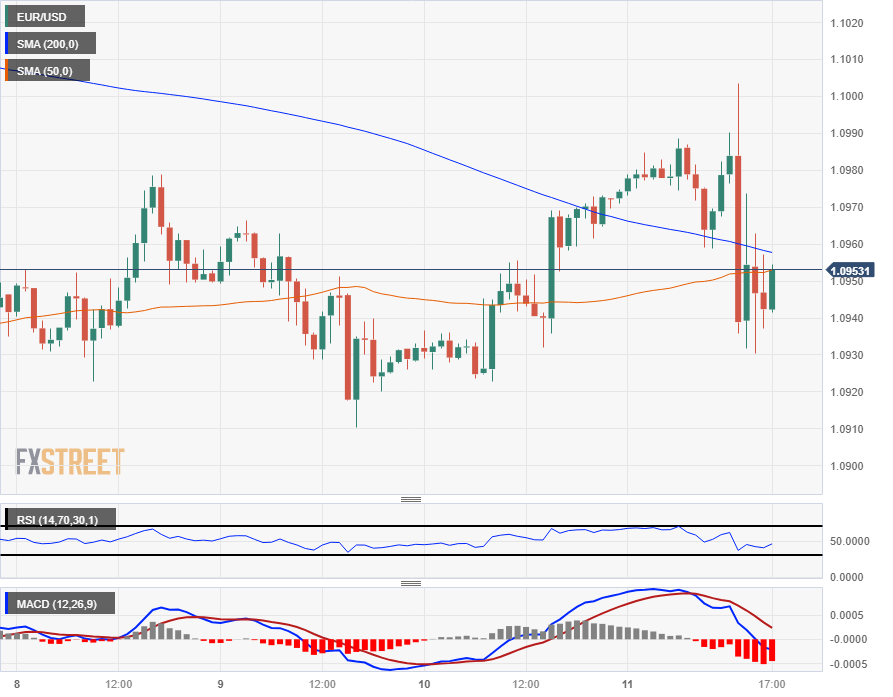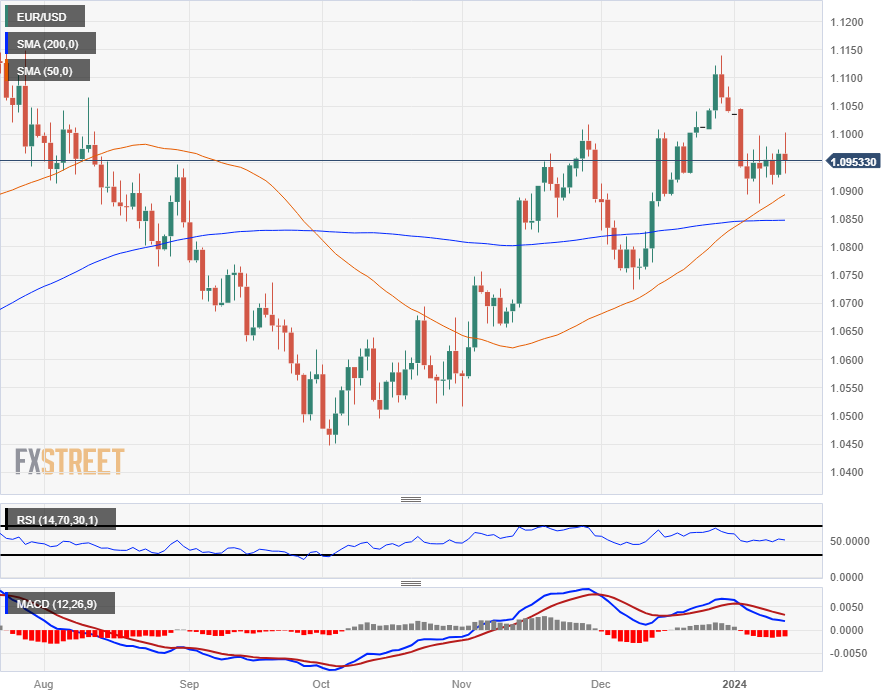- Phân tích
- Tin tức và các công cụ
- Tin tức thị trường
- Euro slips against Greenback after tough grind higher, knocked down by post-CPI momentum
Euro slips against Greenback after tough grind higher, knocked down by post-CPI momentum
- The Euro chipped lower against the US Dollar on Thursday despite broadly rising.
- European Economic Bulletin highlighted the ECB’s data-dependency on inflation outlook.
- US PPI inflation due Friday, EU Industrial Production next Monday.
The Euro (EUR) fell back against the US Dollar (USD) in the US market session after US Consumer Price Index (CPI) inflation figures broadly arrived higher than market forecasts, taking a chunk out of the Euro’s overall positive lean to the day. The Euro stepped higher against most of the major currencies on Thursday but fell flat against the safe havens of the Greenback and the Japanese Yen (JPY).
The European Central Bank’s (ECB) latest Economic Bulletin mostly towed the line earlier Thursday, reaffirming the ECB’s data-dependency as the ECB continues to focus on inflation expectations for the European economy.
Daily digest market movers: Euro loses some ground against safe havens
- The Euro saw firm gains early Thursday before a slight knockback following the US CPI release.
- US CPI inflation climbed higher than expected in December, with headline inflation rising 0.3% MoM versus the forecast of 0.2% and November’s 0.1%.
- Annualized core US CPI ticked down from 4.0% to 3.9%, less than the market’s expected decline to 3.8%.
- YoY December headline CPI stepped higher to 3.4% from 3.1%, beating the forecast of 3.2%.
- Rising inflation will make it tougher for the Federal Reserve (Fed) to justify rate cuts as soon as markets hope.
- See more: US CPI inflation climbs to 3.4% in December vs. 3.2% expected
- Cleveland Fed President Loretta Mester says Fed is not “there yet” on rate cuts
- European Economic Bulletin noted that the ECB remains firmly focused on data releases, rate cuts hinge on forward-looking inflation expectations.
- Economic Bulletin also highlighted slight contraction in euro area economy in 3Q 2023, blames decline in inventories.
- ECB expects growth to continue to weaken heading forward but noted that employment remains firm.
Euro price today
The table below shows the percentage change of Euro (EUR) against listed major currencies today. Euro was the weakest against the US Dollar.
| USD | EUR | GBP | CAD | AUD | JPY | NZD | CHF | |
| USD | 0.19% | 0.18% | 0.34% | 0.68% | 0.13% | 0.22% | 0.55% | |
| EUR | -0.19% | -0.02% | 0.13% | 0.48% | -0.07% | 0.01% | 0.38% | |
| GBP | -0.19% | 0.01% | 0.16% | 0.50% | -0.06% | 0.03% | 0.38% | |
| CAD | -0.34% | -0.14% | -0.16% | 0.33% | -0.20% | -0.12% | 0.22% | |
| AUD | -0.68% | -0.47% | -0.48% | -0.33% | -0.53% | -0.45% | -0.12% | |
| JPY | -0.13% | 0.07% | 0.06% | 0.18% | 0.54% | 0.07% | 0.42% | |
| NZD | -0.23% | 0.01% | -0.03% | 0.12% | 0.46% | -0.10% | 0.36% | |
| CHF | -0.56% | -0.36% | -0.38% | -0.22% | 0.13% | -0.43% | -0.33% |
The heat map shows percentage changes of major currencies against each other. The base currency is picked from the left column, while the quote currency is picked from the top row. For example, if you pick the Euro from the left column and move along the horizontal line to the Japanese Yen, the percentage change displayed in the box will represent EUR (base)/JPY (quote).
Technical Analysis: Euro holds steady against other risk assets but sheds weight against Greenback and Yen
The Euro (EUR) was broadly firmer in early Thursday trading, climbing half a percent against the Australian Dollar (AUD) and a third of a percent against the Swiss Franc (CHF). However, the Euro has lost a fifth of a percent against the US Dollar (USD) and around a tenth of a percent against the Japanese Yen (JPY) as safe havens climb broadly higher on the day.
The EUR/USD hoisted itself into the 1.1000 handle early Thursday, setting a new 2024 high of 1.1004 before getting slapped down to trade back into 1.0950. The pair has slid back into near-term congestion at the 200-hour Simple Moving Average (SMA) near 1.0960.
Despite exploring a fresh high on Thursday, the EUR/USD remains trapped in a minor sideways pattern, with daily candles coiling just north of a bullish crossover of the 50-day and 200-day SMAs near 1.0850. The 50-day SMA is rising into 1.0900, building out a technical floor beneath bids as bulls gear up for another challenge.
The EUR/USD remains down around 1.6% from December’s late peak near 1.1140, but the pair is still fairly well-bid, up a little under 5% from last September’s bottom bids near 1.0450.
EUR/USD Hourly Chart

EUR/USD Daily Chart

Euro FAQs
What is the Euro?
The Euro is the currency for the 20 European Union countries that belong to the Eurozone. It is the second most heavily traded currency in the world behind the US Dollar. In 2022, it accounted for 31% of all foreign exchange transactions, with an average daily turnover of over $2.2 trillion a day.
EUR/USD is the most heavily traded currency pair in the world, accounting for an estimated 30% off all transactions, followed by EUR/JPY (4%), EUR/GBP (3%) and EUR/AUD (2%).
What is the ECB and how does it impact the Euro?
The European Central Bank (ECB) in Frankfurt, Germany, is the reserve bank for the Eurozone. The ECB sets interest rates and manages monetary policy.
The ECB’s primary mandate is to maintain price stability, which means either controlling inflation or stimulating growth. Its primary tool is the raising or lowering of interest rates. Relatively high interest rates – or the expectation of higher rates – will usually benefit the Euro and vice versa.
The ECB Governing Council makes monetary policy decisions at meetings held eight times a year. Decisions are made by heads of the Eurozone national banks and six permanent members, including the President of the ECB, Christine Lagarde.
How does inflation data impact the value of the Euro?
Eurozone inflation data, measured by the Harmonized Index of Consumer Prices (HICP), is an important econometric for the Euro. If inflation rises more than expected, especially if above the ECB’s 2% target, it obliges the ECB to raise interest rates to bring it back under control.
Relatively high interest rates compared to its counterparts will usually benefit the Euro, as it makes the region more attractive as a place for global investors to park their money.
How does economic data influence the value of the Euro?
Data releases gauge the health of the economy and can impact on the Euro. Indicators such as GDP, Manufacturing and Services PMIs, employment, and consumer sentiment surveys can all influence the direction of the single currency.
A strong economy is good for the Euro. Not only does it attract more foreign investment but it may encourage the ECB to put up interest rates, which will directly strengthen the Euro. Otherwise, if economic data is weak, the Euro is likely to fall.
Economic data for the four largest economies in the euro area (Germany, France, Italy and Spain) are especially significant, as they account for 75% of the Eurozone’s economy.
How does the Trade Balance impact the Euro?
Another significant data release for the Euro is the Trade Balance. This indicator measures the difference between what a country earns from its exports and what it spends on imports over a given period.
If a country produces highly sought after exports then its currency will gain in value purely from the extra demand created from foreign buyers seeking to purchase these goods. Therefore, a positive net Trade Balance strengthens a currency and vice versa for a negative balance.
© 2000-2026. Bản quyền Teletrade.
Trang web này được quản lý bởi Teletrade D.J. LLC 2351 LLC 2022 (Euro House, Richmond Hill Road, Kingstown, VC0100, St. Vincent and the Grenadines).
Thông tin trên trang web không phải là cơ sở để đưa ra quyết định đầu tư và chỉ được cung cấp cho mục đích làm quen.
Giao dịch trên thị trường tài chính (đặc biệt là giao dịch sử dụng các công cụ biên) mở ra những cơ hội lớn và tạo điều kiện cho các nhà đầu tư sẵn sàng mạo hiểm để thu lợi nhuận, tuy nhiên nó mang trong mình nguy cơ rủi ro khá cao. Chính vì vậy trước khi tiến hành giao dịch cần phải xem xét mọi mặt vấn đề chấp nhận tiến hành giao dịch cụ thể xét theo quan điểm của nguồn lực tài chính sẵn có và mức độ am hiểu thị trường tài chính.
Sử dụng thông tin: sử dụng toàn bộ hay riêng biệt các dữ liệu trên trang web của công ty TeleTrade như một nguồn cung cấp thông tin nhất định. Việc sử dụng tư liệu từ trang web cần kèm theo liên kết đến trang teletrade.vn. Việc tự động thu thập số liệu cũng như thông tin từ trang web TeleTrade đều không được phép.
Xin vui lòng liên hệ với pr@teletrade.global nếu có câu hỏi.















